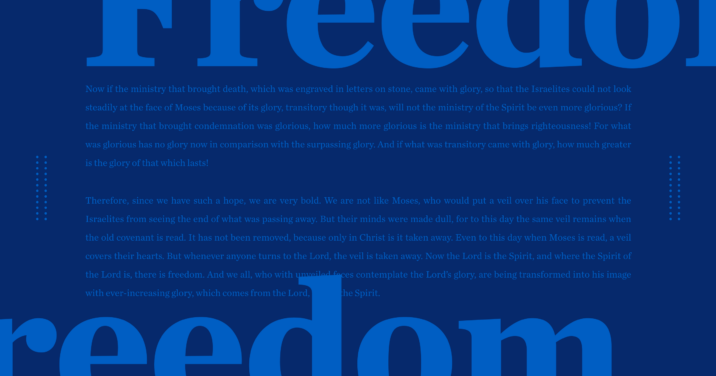In 2 Corinthians 3:17, the apostle Paul writes, “Now the Lord is the Spirit, and where the Spirit of the Lord is, there is freedom.”
Two immediate questions come to mind.
- What does “the Lord is Spirit” mean?
- What sort of freedom does the Spirit give?
The context of 2 Corinthians 3:17
The surrounding context of 2 Corinthians 3:17 guides us to answers to these questions. The Corinthians had challenged Paul’s authority. In response, the apostle Paul rhetorically asks if he needs a letter of recommendation to instruct the Corinthians (2 Cor 3:1). He does not. After all, Paul explains:
You yourselves are our letter of recommendation, written on our hearts, to be known and read by all. And you show that you are a letter from Christ delivered by us, written not with ink but with the Spirit of the living God, not on tablets of stone but on tablets of human hearts. (2 Cor 3:1–2)1
In other words, the Corinthians believers are Paul’s letter of recommendation. Paul preached to them, and they came to know Christ through his ministry. The Spirit written upon their hearts shows the truth of their salvation.
Not content to rely on his prior ministry to the Corinthians, Paul shows how his apostolic ministry of the Spirit surpasses the Mosaic ministry of the law. As Colin Kruse writes,
Paul’s main concern in chapter 3 is to highlight the greater glory of the new covenant of the Spirit (cf. vv. 3, 6, 8, 18), which he contrasts with the lesser glory of the old covenant of the law.2
In this context, Paul affirms both that “the Lord is Spirit” and that the Spirit gives believers freedom. The freedom that the Spirit gives then shows the value of Paul’s apostolic ministry. But in what way?
What does Paul mean by “freedom”?
Commentators differ on the specifics, but it is clear that the freedom of the Spirit contrasts with the ministry of the law. Paul spends the entire chapter contrasting the new and old covenants (2 Cor 3). The freedom of the Spirit liberates one from the law and bestows upon one the glory of the new covenant.
A number of commentators try to identify a more exact definition of “freedom” in 2 Corinthians 3:17 by cross-referencing Paul’s letter to the Galatians. For example, Michael Gorman believes that the freedom of the Spirit “is not freedom from the fundamental covenantal obligations but freedom for them, as he says quite plainly in Gal 5:13–18.”3 In short, Gorman points to Paul’s argument that Christian freedom accomplishes the law as one walks by the Spirit.
Frederick W. Danker draws a sharper contrast between the Spirit’s freedom and the law, while pointing to Galatians 4:1–11 as the most important cross-reference: “The presence of the Spirit of the Lord promotes freedom, that is liberation from the law, and Galatians 4:1–11 is the best commentary on Paul’s meaning.”4 In this case, Danker draws on Paul’s contrast between being a slave to the law and under it as a guardian (Gal 4:2) with our adoption as sons, which frees us from this slavery.
Colin Kruse similarly argues that Galatians explains Paul’s understanding of freedom in 2 Corinthians 3:17 but points to a different passage in Paul’s letter. Kruse writes, “Probably the best commentary on this freedom is Galatians 3:23-35, where the apostle describes the Jewish people as those ‘held in custody under the law,’ the law being their ‘guardian until Christ came.’”5 Kruse then cites a fourth passage in Galatians to show that Christians no longer live under the yoke of slavery (Gal 5:1).
Scripture interprets Scripture. But Gorman, Danker, and Kruse all cite different passages in Galatians to explain 2 Corinthians 3:17. Which is the best cross-reference? By carefully observing how Paul contrasts the old and new covenants in 2 Corinthians, the answer to this question becomes clearer—and so does what Paul means by freedom.
How does Paul contrast the old and new covenants?
Paul contrasts the new covenant ministry of the Spirit with the old covenant ministry of the law in about six ways. Gorman illustrates the oppositions as follows (2017: 355):
| The Old Covenant | The New Covenant |
| of (the) letter (3:6) | of (the) Spirit (3:6) |
| ministry of death (3:6, 7) | gives life (3:6) |
| chiseled on stone tablets (3:3, 7) | written on human hearts (3:3) |
| came in glory (3:7) | came in greater glory (3:10–11) |
| ministry of condemnation (3:9) | ministry of justification/righteousness (3:9) |
| it and its glory now set aside (3:7, 10–11) | permanent (3:11) |
Each of these contrasts tell us something important about the Holy Spirit. The new covenant is a spiritual covenant first of all. And as the creed tell us, the Spirit is Lord and giver of life, who indwells the hearts of believers. The glory of God closely associates with the presence of the Holy Spirit. Jesus himself was justified in the Spirit (1 Tim 3:16); and since the Spirit is consubstantial with Father and Son, he and the new covenant are permanent.
These oppositions that Paul posits illustrate what the freedom of the Spirit looks like. This freedom signals the liberation of the old covenant law code as a law code over believers. It means that believers have the full experience of the new covenant in the Spirit.
However, as Mark Seifrid explains, “‘Freedom from’ is always ‘freedom for.’”6 In other words, Paul can both say, “For freedom Christ has set us free; stand firm therefore, and do not submit again to a yoke of slavery,” and, “Bear one another’s burdens, and so fulfill the law of Christ” (Gal 5:1; 6:2).
When Paul says, “where the Spirit of the Lord is, there is freedom,” he means that we are free to enjoy the blessings of the new covenant ministry of the Holy Spirit and free from the ministry of death in the law. And as a consequence, “we all, with unveiled face, beholding the glory of the Lord, are being transformed into the same image from one degree of glory to another” (2 Cor 3:18).
Where is the Spirit?
The apostle Paul says that God wrote the Spirit on the hearts of the Corinthians believers. As spiritual ink on the papered-hearts of the Corinthians, the Spirit is where any believer is. And as Paul has argued and will argue again shortly, God gave the Spirit as a down payment or guarantee of our full salvation (2 Cor 1:22; 5:22). The Spirit is where anyone united to Christ by faith is.
How is the Lord the Spirit?
The second difficult question is how the Lord is the Spirit. In the New Testament, the word Lord usually applies to Christ. Paul in his first letter to the Corinthians confesses that there is “one Lord, Jesus Christ” (1 Cor 8:6). If the Spirit is the Lord, then it seems to suggest that the Spirit and Jesus are one person.
Yet elsewhere Paul distinguishes the Lord Jesus from the Spirit. For example, Paul affirms that “no one can say ‘Jesus is Lord’ except in the Holy Spirit” (1 Cor 12:3). He even concludes 2 Corinthians by distinguishing the Father, Son, and Spirit: “The grace of the Lord Jesus Christ and the love of God and the fellowship of the Holy Spirit be with you all” (2 Cor 13:14).
Scripture regularly distinguishes Christ from the Spirit. It also affirms that Christ and the Spirit share the same divine nature. Didymus the Blind in his On the Holy Spirit (§236, §252) and Basil of Caesarea in his work of the same title make that very point in their comments on 2 Corinthians 3:17 (§24.55). Basil, for example, reasons that while all humans are enslaved, the Spirit himself is free by nature. For this reason, he sees in Paul’s statement a confirmation of the Holy Spirit’s full divinity.
Basil rightly sees some indication of the Spirit’s divine nature; and rightly denies that Christ and the Holy Spirit are the same divine person. Instead, Paul identifies the Spirit as divine by the phrase the “Spirit of the Lord.” This phrase appears twenty-two times in the LXX (the Greek Translation of the Hebrew Bible) to show that the Spirit is the Spirit of God. In the LXX, the phrase “Spirit of the Lord” usually refers to the Spirit of God.7 Confirming this interpretation, Paul cites Exodus 34:34 in 2 Corinthians 3:16 in which “the Lord” refers to God. Given this close context, the word “Lord” in verses 16 and 17 refers to God. So calling the Spirit Lord in 2 Corinthians 3:17 functions as a powerful proof that the Spirit is divine.
Murray Harris comments,
“The Lord” referred to in the quotation from Exodus 34:34, to whom the Jew must now turn for the removal of the veil, is in the present era none other than the life-giving Spirit of the living God (cf. vv. 3, 6, 8).8
In other words, while Moses alone could commune with God face to face under the old covenant, we who have the Holy Spirit can see God with unveiled faces. We behold the glory of the Lord, Paul says (2 Cor 3:18). “For,” Paul explains, “this comes from the Lord who is the Spirit” (2 Cor 3:18).
How does the Holy Spirit bring freedom?
The Holy Spirit brings us freedom in the new covenant by faith. The fourth-century commentator known as Ambrosiaster draws both on the nature of the Holy Spirit and on the Spirit’s new covenant ministry to make a similar point:
Because God is Spirit, he has given through Christ the law of the Spirit, which persuades us to believe in invisible things which our reasoning understands spiritually. This law gives liberty because it demands only faith, and because it believes what it does not see we earn the right to be rescued from our condition.
This ancient opinion compares well to the Reformational rediscovery of the Christian’s freedom. Martin Luther, in particular, wrote his On The Freedom of a Christian in 1520 as something of a summary of the Christian faith. Christians, he argues, are free because Christ alone justifies us. The Word of God is above all earthly powers.
Reformed thinkers such as John Calvin and William Perkins likewise affirmed Christian freedom in connection to the doctrine of justification. If Christ justifies us by faith, then no earthly power can bind our consciences. God as the judge of all the earth alone can.
As Paul notes, the old covenant was a “ministry of condemnation” (2 Cor 3:8). In contrast, the ministry of righteousness gives us hope and boldness to approach God like Moses did (2 Cor 3:12–13, 16–18). By the unveiling of the Lord (2 Cor 3:16), we see the glory of the Lord and are so transformed (2 Cor 17–18). This, Paul calls freedom. And it involves not just unveiling but enlightening, so that our minds can see “the light of the gospel of the glory of Christ, who is the image of God” (2 Cor 4:4).
And that gospel, of which blessing the Spirit is the guarantor (2 Cor 5:5), reconciles us to God through Christ (2 Cor 5:18). “For our sake,” Paul says, “he made him to be sin who knew no sin, so that in him we might become the righteousness of God” (2 Cor 3:18). Hence, Paul calls his ministry “the ministry of righteousness” (2 Cor 3:9). It means that we can by faith freely come to the Lord with unveiled faces. This freedom means that no earthly power can condemn our consciences, because the ministry of righteousness grants us the righteousness of Christ.
Related resources

Commentaries on Romans and 1-2 Corinthians (Ancient Christian Texts)
Regular price: $41.99

Works on the Spirit: Athanasius’s Letters to Serapion on the Holy Spirit, and, Didymus’s on the Holy Spirit (Popular Patristics Series)
Regular price: $13.99
Apostle of the Crucified Lord: A Theological Introduction to Paul and His Letters, 2nd ed.
Regular price: $34.99
The Expositor’s Bible Commentary, Volume 11: Romans–Galatians (Revised Edition) (REBC)
Regular price: $42.99
- All Scripture quotations come from the English Standard Version.
- Colin G. Kruse, 2 Corinthians: An Introduction and Commentary, ed. Eckhard J. Schnabel, Tyndale New Testament Commentaries 8, 2nd ed. (Nottingham: InterVarsity Press, 2015), 135.
- Michael J. Gorman, Apostle of the Crucified Lord: A Theological Introduction to Paul & His Letters, 2nd ed. (Grand Rapids, IL: Eerdmans, 2017), 355.
- Frederick W. Danker, II Corinthians, Augsburg Commentary on the New Testament (Minneapolis, MN: Augsburg Publishing House, 1989), 58; bold text original
- Kruse, 2 Corinthians, 135.
- Mark A. Seifrid, The Second Letter to the Corinthians (Grand Rapids, IL: Eerdmans, 2014), 177.
- See Kruse, 2 Corinthians, 135.
- Murray Harris, Jesus as God: The New Testament Use of Theos in Reference to Jesus (Eugene, OR: Wipf & Stock, 2008), 464.









